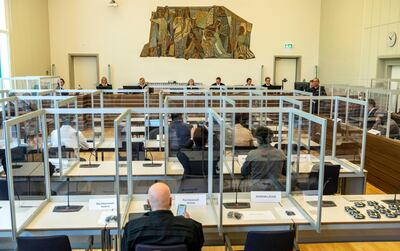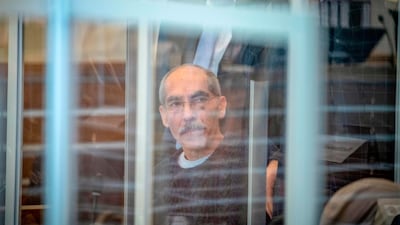A Syrian former intelligence officer on Monday denied beating and torturing detainees in prison as he faced trial in a German court for crimes against humanity.
Anwar Raslan, 57, is charged with overseeing the murder of 58 people and the torture of 4,000 others at the Al Khatib detention centre in Damascus.
Mr Raslan said he had "never acted inhumanely" and that rather than torturing prisoners, he had "helped to free" many detainees arrested in the uprising against Syrian President Bashar Al Assad from March 2011.
He added that he had "neither beaten nor tortured" prisoners.
It is the first time he has spoken publicly about the crimes he is charged with, allegedly committed at the prison between April 29, 2011, and September 7, 2012.
Mr Raslan, wearing glasses and a dark jacket and sweater, appeared in court behind a plexiglass screen because of the coronavirus outbreak. His lawyers Michael Boecker and Yorck Fratzky took about 90 minutes to read his statement.
The trial in Koblenz, which began on April 23, is the first court case worldwide over state-sponsored torture by the Assad regime.
Mr Raslan and fellow defendant Eyad Al Gharib, 43, are being tried on the principle of universal jurisdiction, which allows a foreign country to prosecute crimes against humanity.

At the opening of the trial, prosecutors said Mr Raslan had overseen rape and sexual abuse, "electric shocks", beatings with "fists, wires and whips" and "sleep deprivation" at the prison.
Referring to accusations made by witnesses, he repeatedly denied any responsibility, particularly in the case of alleged rape. "It is against our morals, against our religion," he said.
"I distance myself from such acts if they have been committed," he added.
Mr Raslan worked for 18 years in the Syrian intelligence services, where he rose through the ranks to become head of the domestic intelligence "investigation" service, according to a German investigator who testified on the second day of the trial.
Mr Raslan defected and fled Syria at the end of 2012 before arriving in Germany in July 2014 under a programme for Syrian refugees in need of special protection.
He said he "did not and would not condone" the abuses committed by the Syrian regime" and felt "regret and compassion" for all the victims.
The trial could last up to two years with the victims due to begin testifying in July.
According to German investigators, they have reported flogging, electric shocks, cigarette burns and blows to the genitals. Some say they were hung by the wrists, with only the tips of their feet still touching the ground.
Wolfgang Kaleck, secretary general of the German NGO European Centre for Constitutional and Human Rights, which is supporting 17 victims in the proceedings, said Mr Raslan had issued, not merely received and followed, orders in his department.
"We do not believe he played a minor role," Mr Kaleck said.
Public prosecutor Jasper Klinge said at the opening of the trial that Mr Raslan "knew the extent of the torture" which took place in order to extract "confessions and information about the [Syrian] opposition".
According to the UK-based Syrian Observatory for Human Rights monitoring group, at least 60,000 people have been killed under torture or as a result of the terrible conditions in Assad's detention centres.
Fellow defendant Mr Al Gharib is accused of being an accomplice to crimes against humanity, having helped to arrest protesters and deliver them to Al Khatib in the autumn of 2011.

